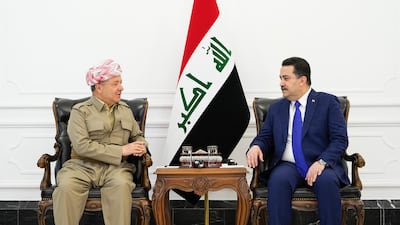Veteran Kurdish politician Masoud Barzani is visiting Baghdad for his first visit in nearly six years, marking a symbolic trip at a time of tension between Iraqi authorities and those in the Kurdish region.
Mr Barzani, a former president of Iraq's Kurdish region who leads the Kurdistan Democratic Party, was received at the airport on Wednesday by five ministers including Foreign Minister Fuad Hussein and Defence Minister Thabet Al Abassi, before meeting Prime Minister Mohammed Shia Al Sudani.
"This visit to Baghdad, given the significance of the meetings and dialogues, is particularly important as we speak with a national leadership who plays a major role in the political process," Mr Al Sudani said during the meeting.
"We had a constructive and purposeful dialogue regarding various internal issues and the situation in the region."
Mr Barzani called the discussions "constructive", saying the "viewpoints were identical".
"My visit to Baghdad is to boost the efforts previously made and led by the Prime Minister, which resulted in a real breakthrough in the relationship between the federal and the region's governments," he said.
Mr Barzani then met political leaders, including those of Iran-backed factions.
One of his meetings was with the Co-ordination Framework, the largest political group in the Iraqi Parliament, which consists of pro-Iran political factions and militias.
That meeting took place at the residence of senior Shiite leader Ammar Al Hakim, who leads Iraq’s National Wisdom Movement within the Co-ordination Framework.
Mr Barzani also met the ambassadors of the US, UK, France, China and Russia, his office said.
Earlier, a government official told The National that the visit was to “to push forward talks over different issues, building on recent developments in this regard".
“His presence will help further melting the ice and paving the way for more developments.”
The Kurdish region officially gained autonomy after the 2003 US-led invasion that toppled Saddam Hussein, formalising a de facto situation that had held since 1992, when Iraqi government forces withdrew from the region after their defeat in the 1991 Gulf War.
Its autonomy was strengthened and recognised in Iraq's 2005 constitution.
Since then, the region has been at odds with the federal authorities in Baghdad on issues including rights to develop and market oil and gas, the region’s share in the federal budget and Kurdish claims to land outside its official jurisdiction.
Relations soured in September 2017 when the Kurdish region held an independence referendum, prompting punitive measures from the federal authorities.
In early 2022, the tension with Baghdad increased when the Kurdish oil and gas sector took a major blow from Iraq’s Federal Supreme Court, which ruled that the region's law regulating the industry was unconstitutional.
The court also demanded that the region hand over all of the oil industry’s activities to Baghdad, including exports.
Almost a year later, a second blow came when the arbitration of the Paris-based International Chamber of Commerce forced Turkey to halt the flow of about 500,000 barrels of oil per day.
Of those, about 70,000 barrels came from Baghdad-run fields in the northern province of Kirkuk.
Since then, no major progress has been achieved to resume oil exports and Baghdad is still waiting to take over the region's oil industry.
But there has been some progress in some areas.
In recent months, the region accepted to send the lists of its employees to federal authorities to be paid directly by Baghdad. It also started handing over non-oil revenue to the federal government.
Both Bagdad and Erbil have been co-operating on security issues, handing over suspects to federal authorities and launching joint security operations in the region.
On Monday, they announced the arrests of three suspects linked to the outlawed militant Kurdistan Workers’ Party, accusing them of sabotage attacks.


